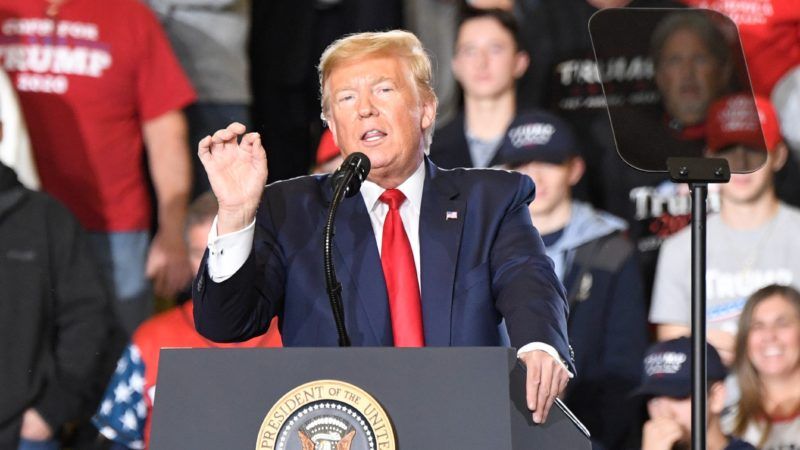Trump Has Fully Embraced the Idea That Deficits Don't Matter
The president likes things big, so that apparently applies to government budgets too.

There's a newly popular leftist economic concept known as Modern Monetary Theory, which argues that because the government prints its own money it doesn't have to worry about running up deficits or even raising taxes to pay for more government spending. According to this idea, the currency is a public monopoly, so the government has few restrictions on its funding. It can't go bankrupt because it owns the printing presses.
The burgeoning economic justifications for this trendy theory seem rather complex at first glance. But it's one of the simplest ideas in the world. Government can give everything away to everyone—and no one has to pay the price. It's a trendy form of magical thinking wrapped up in some economic mumbo-jumbo.
"Why in the world would grown people actually believe that?" asks William Anderson, an economics professor at Frostburg State University in Maryland. "It's because they believe in government the same way you and I believe in God." It's the ideal theory for those who want far-reaching programs but are frustrated by resistance to higher taxes and concerns about deficits and debt. People believe it because it lets them justify their big-spending agenda.
It was no surprise, then, when U.S. Rep. Alexandria Ocasio-Cortez, the high-profile New York Democrat who is a member of the left-wing "squad," last year embraced the notion. When questioned about how she plans on paying for her laundry-list of new programs, she and other progressives touted a much higher federal tax burden. Conservatives pounced on that proposal, but then Ocasio-Cortez and others argued that MMT "absolutely" needs to be "larger part of our conversation."
Apparently, left-wingers aren't the only ones these days who want to have a chat about "free money" economic theories. At a fund-raiser at his Mar-a-Lago resort last week, President Donald Trump touted his enormous new Pentagon budget (which he inaccurately pinned at $2.5 trillion) and reportedly dismissed concerns about growing deficits and federal debt: "Who the hell cares about the budget? We're going to have a country."
I suppose the president's newfound embrace of progressive economics is understandable. When he was running for president, Trump said he would eliminate the nation's $19-trillion debt in eight years. More than three years into his administration, the U.S. national debt has topped $23 trillion and is racing higher, despite the ongoing economic boom. Annual deficits are up 11.8 percent since last year and have now topped an astonishing $1 trillion.
It's easier to say that they just don't matter, even if the president hasn't come up with a cockamamie economic theory to justify his (and Congress') profligacy. The president likes things big, so that apparently applies to government budgets, too. There is something refreshing—albeit in a disturbing and cynical way—about Republicans who now reject the concept of fiscal responsibility.
The party has claimed to care about government spending over my entire lifetime, and yet has never done anything other than boost the federal budget. Democrats shrug at debt spending because they want to spend more on Medicare-for-all, free college, universal basic income and a list of social programs that rises faster than a barrel of red ink. Republicans shrug because their nationalist agenda of military spending and space forces requires the constant churning of the government printing presses. It's no problem if one believes that such spending actually energizes the economy or, at the very least, doesn't do anything to impede the nation's fiscal health.
Deficits do indeed matter. Traditionally, fiscal conservatives have argued (correctly, I believe) that debt spending crowds out private investment, drives up inflation, reduces personal income, pushes the nation's trust funds toward insolvency, weakens the nation's ability to deal with future crises, and is an act of irresponsibility.
In our current federal situation, debt spending certainly creates all those above-mentioned problems. However, if Modern Monetary Theory takes hold, the government will have even fewer restraints on its spending. Under this theory, "government-issued bonds aren't strictly necessary," Vox explains. The government wouldn't need to issue Treasury bonds, but could "just create the money directly without issuing bonds."
The government's debt spending now is similar to me running up debt for vacations and cars. I'll be OK as long as I make the minimum payments to my creditors. MMT is like giving me a money printing press in my garage. If everyone had one, money would lose its value and we'd get hyperinflation. MMT theorists say spending is no problem as long as inflation is low, but it seems unlikely the government could control inflation after it starts churning out dollars.
We probably won't become Zimbabwe, but a key problem with debt spending revolves around the main reason politicians such as Ocasio-Cortez and Trump want more of it. It leads to never-ending growth in government, which means more bureaucrats micro-managing our lives, less private activity, and a whole lot less freedom.
This column was first published in the Orange County Register.


Show Comments (138)